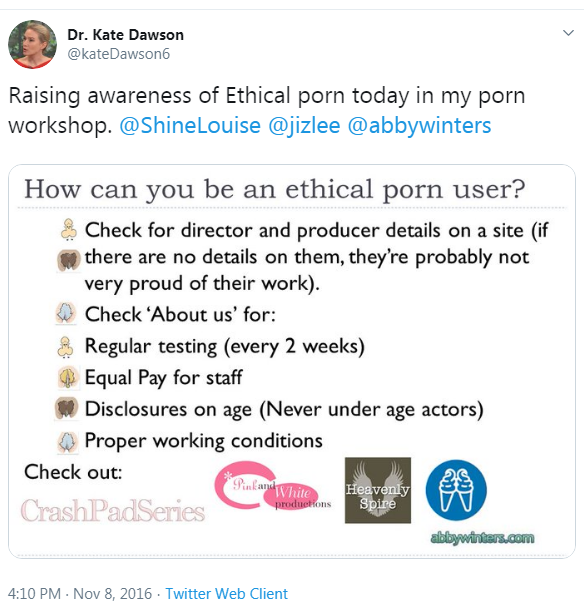Is ‘porn literacy’ something we should be teaching in schools? If so, at what age? What is ‘porn literacy’? Is there such a thing as ‘ethical porn’? To what extent will these things be part of the planned new Relationships and Sexuality Education (RSE) course?
For clues, we might look to Kate Dawson who is a doctoral student at NUI Galway. She believes in ‘porn literacy’ and in ‘ethical porn’. Sometimes she goes into schools to give children her views on sex, porn and relationships as part of the HSE funded WISER [1] (West of Ireland Sex Education Resource) programme.
‘Porn literacy’ is, of course, a highly ambiguous term. It could simply mean teaching students about the negative effects of consuming porn [2] but in a recent article [3], written with two other academics from NUI Galway, Dawson clearly states that one of the learning outcomes of porn literacy is to “reduce shame and increase acceptability [3]” (p. 7). Why should we increase the acceptability of watching porn among school children?
In the same article [3] we read: “A variety of teaching methods could be employed within a porn literacy intervention, including … the use of activities or video content on digital and social media platform” (p. 11).
Recently, Dawson has appeared in various media defending “porn literacy” or criticising the attempts made in different countries to ban online porn that can be accessed by children. She wants pupils shown porn videos [4] so as to help them understand such films are “scripted and dramatised” and to “reduce the shame” of watching [5]. Is this something their parents would feel comfortable about? It seems that she has no principled objection to porn per se. Moreover, as mentioned, she believes in “ethical porn”.

In October 2016, she was one of the authors of the “Porn as Pedagogy” (PAP) event at Tate Modern, in London, where participants were shown a 45 minute selection from “ethical porn” movies. A discussion followed.
One might wonder what “ethical porn” is. From a report [6] she produced we can learn that the organisers at the Tate wanted to “expose the audience to the beauty and variety that exists within the porn industry that is often dominated by heteronormative, sexist and racist content. We knew that all performers involved in the footage were protected and cared for in their working environments and were paid the same rate, regardless of race, gender and sexuality. We knew that safer sex was pre-negotiated between performers for all of their scenes and that they choose what they want to do on screen.”
It is interesting to note that the only moral concern expressed about porn is about how it is made. It is “ethical” as long as it is produced according to certain moral standards. Aside from that, porn is seen as morally neutral, if not actually a good thing.
Dawson comments [6]: “Personally, the experience [at Tate] was transformative. I feel privileged to have learned from these films, and to have had the opportunity to share the work in such a setting. It is safe to say that Pink & White Productions have changed my perspective on porn. This really is porn as it should be.”
What does she want taught in schools? Here [7] you can find some examples of the very explicit language on porn offered to teenagers by Dawson.
It is important to note that we are not talking about some fringe group with extreme views. The WISER programme [8], in which Ms Dawson in involved, is funded by the HSE. We are therefore entitled to ask, is this what the State wants taught in our schools?
Last year, an NUI Galway report [9] on porn was launched by Minister for Higher Education Mary Mitchell O’Connor. Kate Dawson, who contributed to the report, commented [9]: “it is not good enough to just say that ‘porn is bad’ because it is not, people really enjoy watching it, there are a lot of positive uses, but people need to have the skills to make their own mind up about the content they see because porn is so varied.”
Does Minister O’Connor agree that porn in itself is not bad? To what extent should this kind of “porn literacy” be officially included in the RSE programme aimed at school-age children? Should pupils be taught about ‘ethical porn’? Parents deserve answers to these questions.